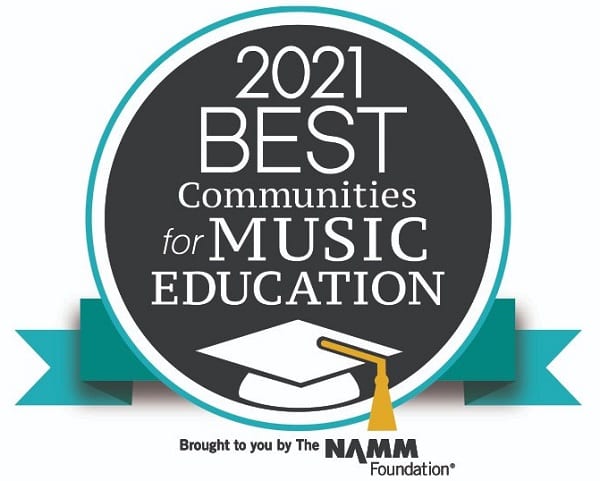BALTIMORE COUNTY, MD—Baltimore County Public Schools has been honored with the Best Communities for Music Education designation from The NAMM Foundation for its outstanding commitment to music education.
Now in its 22nd year, the Best Communities for Music Education designation is awarded to school systems that demonstrate outstanding achievement in providing music access and education to all students.
To qualify for the Best Communities designation, BCPS answered detailed questions about funding, graduation requirements, music class participation, instruction time, facilities, support for the music program and community music-making programs. Responses were verified with school officials and reviewed by The Music Research Institute at the University of Kansas.
“Baltimore County Public Schools has a longstanding tradition of offering students exemplary programming in music education,” said Douglas Handy, director, Career and Technical Education and Fine Arts. “Receiving this national recognition for the 16th consecutive year is evidence of the remarkable stakeholders that comprise the music education community in BCPS.”
Since the passage by Congress in 2015 of the Every Student Succeeds Act (ESSA) and a stated emphasis on a well-rounded education, many school systems have re-committed to music and arts education programs and found that in this time of a national pandemic, music provides a valuable way to keep students engaged in school. ESSA provides designated funding for well-rounded educational opportunities through Title IV Part A Student Academic Success and Achievement grants. NAMM Foundation research has revealed that these grants are being widely used by school systems to address instructional gaps in access to music and arts education.
Baltimore County students can choose among extensive offerings, including courses in music and audio technology, world music, and Advanced Placement Music Theory. Students perform throughout the community in choral groups, jazz ensembles, steel bands, orchestras, and marching bands. In addition, partnerships with the area’s leading arts organizations provide opportunities to see and interact with professional musicians.
Research into music education continues to demonstrate educational/cognitive and social skill benefits for children who make music. After two years of music education, researchers found that participants showed more substantial improvements in how the brain processes speech and reading scores than their less-involved peers, and that students who are involved in music are not only more likely to graduate high school but also to attend college as well. Everyday listening skills are stronger in musically trained children than in those without music training. Significantly, listening skills are closely tied to the ability to perceive speech in a noisy background, pay attention, and keep sounds in memory.
Later in life, individuals who took music lessons as children show stronger neural processing of sound: young adults and even older adults who have not played an instrument for up to 50 years show enhanced neural processing compared to their peers. Social benefits include conflict resolution, teamwork skills, and how to give and receive constructive criticism.
Do you value local journalism? Support NottinghamMD.com today.

